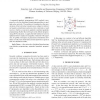Free Online Productivity Tools
i2Speak
i2Symbol
i2OCR
iTex2Img
iWeb2Print
iWeb2Shot
i2Type
iPdf2Split
iPdf2Merge
i2Bopomofo
i2Arabic
i2Style
i2Image
i2PDF
iLatex2Rtf
Sci2ools
133
click to vote
ICASSP
2011
IEEE
2011
IEEE
Fast algorithm for beamforming problems in distributed communication of relay networks
A sequential quadratic programming (SQP) method is proposed to solve the distributed beamforming problem in multiple relay networks. The problem is formulated as the minimization of the total relay transmit power, subject to individual signal-to-interference-and-noise ratio constraints at each receiver, which is a nonconvex quadratic constraint quadratic programming. Rather than solving its semi-definite programming (SDP) relaxation, we apply the SQP method to solve its tightened form to replace its inequality constraints with equalities. Its global convergence is guaranteed. Simulations show that it not only runs much faster, but also performs as good as SDP for calculation results.
Constraint Quadratic Programming | ICASSP 2011 | Quadratic Programming | Sequential Quadratic Programming | Signal Processing |
Related Content
| Added | 20 Aug 2011 |
| Updated | 20 Aug 2011 |
| Type | Journal |
| Year | 2011 |
| Where | ICASSP |
| Authors | Cong Sun, Yaxiang Yuan |
Comments (0)

